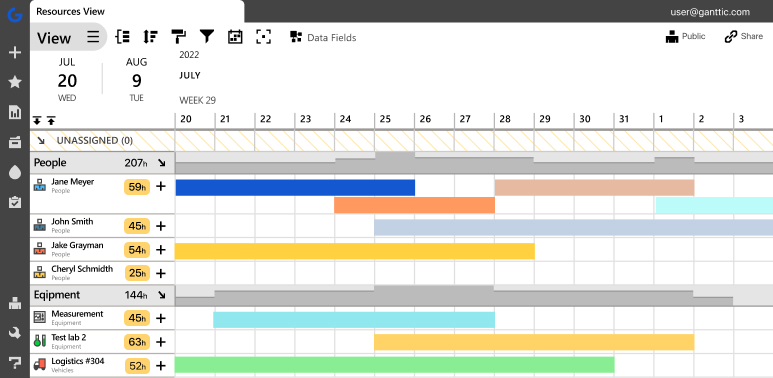For the majority of people, work is like a second home. You spend most of your time dedicated to your workplace. Your co-workers are probably the people you interact with most in your life, second only to your spouse or family.
While we all have a couple of bad Mondays, hard weeks, and even bad quarters, a toxic work environment is like reliving a challenging Monday every single day without rest. Does the thought of work make you tired or gives you low morale? Then that is more than just normal work-stress.
Don’t get caught off-guard. Here are some signs of a toxic workplace environment. As well as some ideas for helping you get out out of these situations.
9 Toxic Work Environment Warning Signs
1. Poor Communication
Feel like you’re left out of the loop regarding important information? Insufficient or confusing communication is the root cause of many problems in the workplace. Good communication is essential for the success of a company.
So, how can you tell that your workplace has poor communication?
- Lack of clarity regarding projects
- Passive-aggressive communication traits from your boss
- Everyone getting different messages
- A lot of off-hours communication
Poor communication usually leads to a lack of purpose among your colleagues. It is often the leading cause of good organizations performing poorly.
If your workplace exhibits these traits, the toxicity is bound to get worse over time.
How to fix it:
Poor communication not only has a negative effect on your team, but it can seep into other aspects of your work as well – delaying projects and keeping you from reaching overall objectives. And can snowball from small nuances, to major, company-wide issues.
That’s why the most effective businesses put an emphasis on tools to help workplace communications. Whether that comes from Gantt charts, Kanban boards, or other project and resource management tools there’s plenty of ways to to enhance the communication and cut out toxic work practices.
2. Cliques and Gossipy Behavior among Employees
Does your workplace feel like junior high once again?
That can be pretty irksome.
It is easy to spot a clique. It is the group of friends who go for lunch together, bring coffee for one another, and laugh at inside jokes, generally keeping to themselves and excluding others. Being left out of an active clique, especially as an adult, is usually alienating.
While workplace friends are fantastic, cliques cross the line and make the workplace counter-productive. That said, you should keep away from the office cool-kids and gossip mongers. That’s a clear characteristic of a toxic work environment.
And are top-level employees and the managers involved in such behavior? That’s an even bigger “nope” from us.
3. Narcissistic Leadership
People don’t leave bad jobs; they leave bad managers.
A bad boss is one that is always on you, trying to control your every move. They are just waiting to pounce on you for a tiny mistake. They feel above the rules, and according to them, you are wrong while they are on the right.
At times, a bad boss is a result of their bad boss – and so on. A hierarchy of poor leadership leads to a toxic workplace, which, in turn, leads to an influx of letters of resignation.
Should your awful boss have a good boss, however, you can seek some help.
How to fix it:
If you just can’t deal with bosses, be one yourself. Now is the perfect time to start your own online business and there are so many small business tools out there that can help you. With all the resources and online tutorials, if there is a will, there is a way. Many of these business models have been proven and time tested – try out blogging, or even ecommerce and become the next Bezos.
4. Driven by Fear, Not Fun
Fear does not drive productivity. It does the opposite. It usually holds back employees from attaining their full potential. While we may attribute workplace fear to bosses who make Michael Myers look like Pikachu, they are not the only cause of office fear.
Other factors leading to fear in the workplace include poor communication and irrational expectations. Are the conversations with your boss centered only around correction but never around celebration? Do people only get rewarded for results only, but not on ethics and behavior?
Employees should be energized by a mission and fun milestones, not dread.
5. Your Boss is Blocking You from Growth

Your boss may not be the tyrannical leader everyone hates. They may be nice and friendly to everyone you included. Everyone dreams of an understanding boss who supports their ambitions and dreams. To many, that is just a dream.
Your boss may start controlling your career path by blocking opportunities for you to advance to the next level. It could either be because they are jealous of you or because you get the work done, and they can’t stand losing you.
If you work hard but get no positive feedback and no recognition at all, that’s a clear sign of a toxic work environment. And an even bigger red flag that your boss might just be using you. If the situation gets really bad you could instead try to strike out on your own with these proven online business ideas.
6. Little to No Enthusiasm
Have a look around your office. Does someone look happy? Do people smile at one another? Do your co-workers exchange pleasantries when walking down the hall? Is the turnover rate low? If the answer to any of these questions is a no, then people are not happy to be working there.
When you are in a company with a great workplace environment, you can feel the energy as people can’t hide contentment. If nobody at your workplace ever says they love working there, then it is time to rethink your options before the low morale gets to you.
How to fix it:
One reason your team may be feeling low is poor project and resource management. When projects and tasks are planned inefficiently it feeds into all areas of the workplace. Putting more stress on your workers, making space for more errors in the workflow, and creating a cycle of problems that can be impossible to break free from.
Properly planned projects with the right resource capacity can help alleviate these issues and lighten up the workplace. Find out some more benefits of project resource management as well as some tips of the most effective strategies.
7. Unhealthy Competition
“Competition breeds excellence.”
That is true, and a little competition in the office is healthy. You want to avoid a workplace where you and your co-workers feel like gladiators. An environment where people foster unhealthy competition levels is toxic. A little motivational comparison here and there is cool, but pitting team members against one another will lead to negativity.
Imagine actively competing for a senior position in the company against your friends. You would achieve more by working together instead of against one another.
“Competition whose motive is merely to compete, to drive some other fellow out, never carries very far” – Henry Ford.
8. Your Work-Life Balance is Pathetic
“All work and no break make Jack a dull boy.”
While it is nearly impossible to have a perfect work-life balance, it is crucial to maintain a healthy relationship with your career. You should be able to turn off all notifications on a Saturday evening or make that appointment with your doctor without feeling a sense of guilt.
Toxic workplaces usually lead to burnout, fatigue, and even illness. That is because of the high-stress levels in their employees. If people are regularly calling in sick, or even worse, coming to the office when sick, those are signs of deteriorating physical and mental health in the workforce.
How to fix it:
The biggest cause of burnout comes from an uneven workload. And if you’re a project or resource manager, there are a number of ways you can help your team out and improve work-life balance for the entire office.
Engage in more flexible planning – adjusting timelines and workloads more often and as needed. Also, find a way to track resource utilization – monitoring the actual time it takes to complete a task and more. This will give you a more accurate representation of the project timeline and can help ensure that no one is working more or less than the rest of the team.
9. Your Gut Tells You Otherwise
You just started your new job, but your intuition is telling you that something is amiss. Trust it. That gut feeling is never wrong. Your sensitive nervous system may alert you of danger in the form of sleepless nights or butterflies in the stomach whenever you check into work.
You can consult a friend or family member, but if you feel like your workplace exudes toxicity, it probably does.
You may brush off these toxic work warning signs, but if they keep recurring, examine why.
Conclusion

Now that you know the signs of a toxic work environment, don’t be subtle about taking action.
There are three things you can do;
- Flag the issues
- Fix the issues
- Find your exit
Start by developing a friendship with a colleague that shares your sentiments and engage in stress-relieving activities after-work.
Your health and well-being should be your first priority. If you develop a concerning health condition or begin questioning your worth, maybe it is time to make some changes.
If you start to see these signs in your current job, consider how online tools and resource management can help alleviate some workplace stress and make it easier for your team to get along.